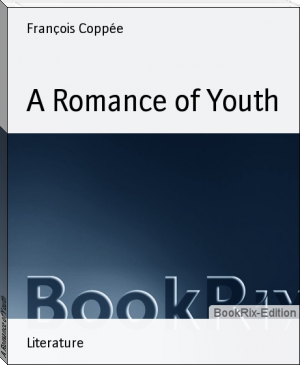International Short Stories: French - - (new books to read .TXT) 📗

- Author: -
- Performer: -
Book online «International Short Stories: French - - (new books to read .TXT) 📗». Author -
This answer, delivered in trembling accents, concealed a delicate irony that was lost on all save me. I asked myself, who is this young woman? The mystery seemed complete. This alone was clear; she was not the daughter of a laundress.
“How did I come here, Citizen Albert?” she asked. “Well, I will tell you. I went to deliver some washing. The lady was not at home, and so I waited; for in these hard times every one needs what little money is coming to him. In that way it grew dark, and so I fell among these gentlemen—beg pardon, I would say citizens. They asked for my pass. As I did not have it with me, they were going to take me to the guard-house. I cried out in terror, which brought you to the scene; and as luck would have it, you are a friend. I said to myself, as M. Albert knows my name to be Solange Ledieu, he will vouch for me; and that you will, will you not, M. Albert?”
“Certainly, I will vouch for you.”
“Very well,” said the leader of the patrol; “and who, pray, will vouch for you, my friend?”
“Danton! Do you know him? Is he a good patriot?”
“Oh, if Danton will vouch for you, I have nothing to say.”
“Well, there is a session of the Cordeliers to-day. Let us go there.”
“Good,” said the leader. “Citizens, let us go to the Cordeliers.”
The club of the Cordeliers met at the old Cordelier monastery in the Rue l’Observance. We arrived there after scarce a minute’s walk. At the door I tore a page from my note-book, wrote a few words upon it with a lead pencil, gave it to the sergeant, and requested him to hand it to Danton, while I waited outside with the men.
The sergeant entered the clubhouse and returned with Danton.
“What!” said he to me; “they have arrested you, my friend? You, the friend of Camilles—you, one of the most loyal republicans? Citizens,” he continued, addressing the sergeant, “I vouch for him. Is that sufficient?”
“You vouch for him. Do you also vouch for her?” asked the stubborn sergeant.
“For her? To whom do you refer?”
“This girl.”
“For everything; for everybody who may be in his company. Does that satisfy you?”
“Yes,” said the man; “especially since I have had the privilege of seeing you.”
With a cheer for Danton, the patrol marched away. I was about to thank Danton, when his name was called repeatedly within.
“Pardon me, my friend,” he said; “you hear? There is my hand; I must leave you—the left. I gave my right to the sergeant. Who knows, the good patriot may have scrofula?”
“I’m coming!” he exclaimed, addressing those within in his mighty voice with which he could pacify or arouse the masses. He hastened into the house.
I remained standing at the door, alone with my unknown.
“And now, my lady,” I said, “whither would you have me escort you? I am at your disposal.”
“Why, to Mme. Ledieu,” she said with a laugh. “I told you she was my mother.”
“And where does Mme. Ledieu reside?”
“Rue Ferou, 24.”
“Then, let us proceed to Rue Ferou, 24.”
On the way neither of us spoke a word. But by the light of the moon, enthroned in serene glory in the sky, I was able to observe her at my leisure. She was a charming girl of twenty or twenty-two—brunette, with large blue eyes, more expressive of intelligence than melancholy—a finely chiseled nose, mocking lips, teeth of pearl, hands like a queen’s, and feet like a child’s; and all these, in spite of her costume of a laundress, betokened an aristocratic air that had aroused the sergeant’s suspicions not without justice.
Arrived at the door of the house, we looked at each other a moment in silence.
“Well, my dear M. Albert, what do you wish?” my fair unknown asked with a smile.
“I was about to say, my dear Mlle. Solange, that it was hardly worth while to meet if we are to part so soon.”
“Oh, I beg ten thousand pardons! I find it was well worth the while; for if I had not met you, I should have been dragged to the guard-house, and there it would have been discovered that I am not the daughter of Mme. Ledieu—in fact, it would have developed that I am an aristocrat, and in all likelihood they would have cut off my head.”
“You admit, then, that you are an aristocrat?”
“I admit nothing.”
“At least you might tell me your name.”
“Solange.”
“I know very well that this name, which I gave you on the inspiration of the moment, is not your right name.”
“No matter; I like it, and I am going to keep it—at least for you.”
“Why should you keep it for me? if we are not to meet again?”
“I did not say that. I only said that if we should meet again it will not be necessary for you to know my name any more than that I should know yours. To me you will be known as Albert, and to you I shall always be Solange.”
“So be it, then; but I say, Solange,” I began.
“I am listening, Albert,” she replied.
“You are an aristocrat—that you admit.”
“If I did not admit it, you would surmise it, and so my admission would be divested of half its merit.”
“And you were pursued because you were suspected of being an aristocrat?”
“I fear so.”
“And you are hiding to escape persecution?”
“In the Rue Ferou, No. 24, with Mme. Ledieu, whose husband was my father’s coachman. You see, I have no secret from you.”
“And your father?”
“I shall make no concealment, my dear Albert, of anything that relates to me. But my fathers secrets are not my own. My father is in hiding, hoping to make his escape. That is all I can tell you.”
“And what are you going to do?”
“Go with my father, if that be possible. If not, allow him to depart without me until the opportunity offers itself to me to join him.”
“Were you coming from your father when the guard arrested you to-night?”
“Yes.”
“Listen, dearest Solange.”
“I am all attention.”
“You observed all that took place to-night?”
“Yes. I saw that you had powerful influence.”
“I regret my power is not very great. However, I have friends.”
“I made the acquaintance of one of them.”
“And you know he is not one of the least powerful men of the times.”
“Do you intend to enlist his influence to enable my father to escape?”
“No, I reserve him for you.”
“But my father?”
“I have other ways of helping your father.”
“Other ways?” exclaimed Solange, seizing my hands and studying me with an anxious expression.
“If I serve your father, will you then sometimes think kindly of me?”
“Oh, I shall all my life hold you in grateful remembrance!”
She uttered these words with an enchanting expression of devotion. Then she looked at me beseechingly and said:
“But will that satisfy you?”
“Yes,” I said.
“Ah, I was not mistaken. You are kind, generous. I thank you for my father and myself. Even if you should fail, I shall be grateful for what you have already done!”
“When shall we meet again, Solange?”
“When do you think it necessary to see me again?”
“To-morrow, when I hope to have good news for you.”
“Well, then, to-morrow.”
“Where?”
“Here.”
“Here in the street?”
“Well, mon Dieu!” she exclaimed. “You see, it is the safest place. For thirty minutes, while we have been talking here, not a soul has passed.”
“Why may I not go to you, or you come to me?”
“Because it would compromise the good people if you should come to me, and you would incur serious risk if I should go to you.”
“Oh, I would give you the pass of one of my relatives.”
“And send your relative to the guillotine if I should be accidentally arrested!”
“True. I will bring you a pass made out in the name of Solange.”
“Charming! You observe Solange is my real name.”
“And the hour?”
“The same at which we met to-night—ten o’clock, if you please.”
“All right; ten o’clock. And how shall we meet?”
“That is very simple. Be at the door at five minutes of ten, and at ten I will come down.”
“Then, at ten to-morrow, dear Solange.”
“To-morrow at ten, dear Albert.”
I wanted to kiss her hand; she offered me her brow.
The next day I was in the street at half past nine. At a quarter of ten Solange opened the door. We were both ahead of time.
With one leap I was by her side.
“I see you have good news,” she said.
“Excellent! First, here is a pass for you.”
“First my father!”
She repelled my hand.
“Your father is saved, if he wishes.”
“Wishes, you say? What is required of him?”
“He must trust me.”
“That is assured.”
“Have you seen him?”
“Yes.”
“You have discussed the situation with him?”
“It was unavoidable. Heaven will help us.”
“Did you tell your father all?”
“I told him you had saved my life yesterday, and that you would perhaps save his to-morrow.”
“To-morrow! Yes, quite right; to-morrow I shall save his life, if it is his will.”
“How? What? Speak! Speak! If that were possible, how fortunately all things have come to pass!”
“However—” I began hesitatingly.
“Well?”
“It will be impossible for you to accompany him.”
“I told you I was resolute.”
“I am quite confident, however, that I shall be able later to procure a passport for you.”
“First tell me about my father; my own distress is less important.”
“Well, I told you I had friends, did I not?”
“Yes.”
“To-day I sought out one of them.”
“Proceed.”
“A man whose name is familiar to you; whose name is a guarantee of courage and honor.”
“And this man is?”
“Marceau.”
“General Marceau?”
“Yes.”
“True, he will keep a promise.”
“Well, he has promised.”
“Mon Dieu! How happy you make me! What has he promised? Tell me all.”
“He has promised to help us.”
“In what manner?”
“In a very simple manner. Kléber has just had him promoted to the command of the western army. He departs to-morrow night.”
“To-morrow night! We shall have no time to make the smallest preparation.”
“There are no preparations to make.”
“I do not understand.”
“He will take your father with him.”
“My father?”
“Yes, as his secretary. Arrived in the Vendée, your father will pledge his word to the general to undertake nothing against France. From there he will escape to Brittany, and from Brittany to England. When he arrives in London, he will inform you; I shall obtain a passport for you, and you will join him in London.”
“To-morrow,” exclaimed Solange; “my father departs tomorrow!”
“There is no time to waste.”
“My father has not been informed.”
“Inform him.”
“To-night?”
“To-night.”
“But how, at this hour?”
“You have a pass and my arm.”
“True. My pass.”
I gave it to her. She thrust it into her bosom.
“Now? your arm?”
I gave her my arm, and we walked away. When we arrived at the Place Turenne—that is, the spot where we had met the night before—she said: “Await me here.”
I bowed and waited.
She disappeared around the corner of what was formerly the Hôtel Malignon. After a lapse of fifteen minutes she returned.
“Come,” she said, “my father wishes to receive and thank you.”
She took my arm and led me up to the Rue St. Guillaume, opposite the Hôtel Mortemart. Arrived here, she took a bunch of keys from her pocket, opened a small, concealed door, took me by the hand, conducted me up two flights of steps, and knocked in a peculiar manner.
A man of forty-eight or fifty years opened the door. He was dressed as a working man and appeared to be a bookbinder. But at the first utterance that burst from his lips, the evidence of the seigneur was unmistakable.
“Monsieur,” he said, “Providence has sent you to us. I regard you an emissary of fate. Is it true that you can save me, or, what is more, that you wish to save me?”
I admitted him completely to my confidence. I informed him that Marceau would take him as his secretary, and would exact no promise other than that he would not take up arms against France.
“I cheerfully promise it now, and will repeat it to him.”
“I





Comments (0)